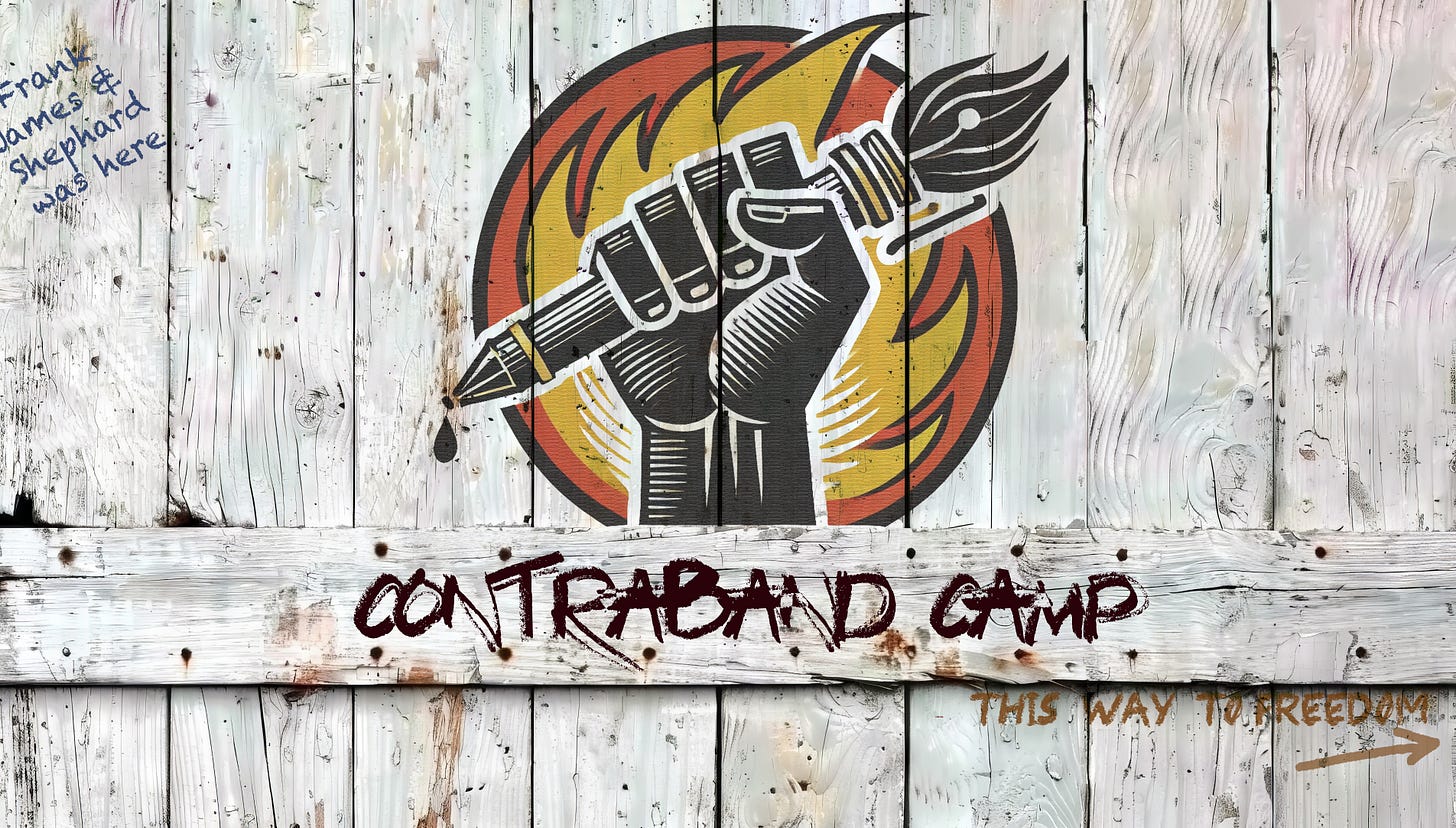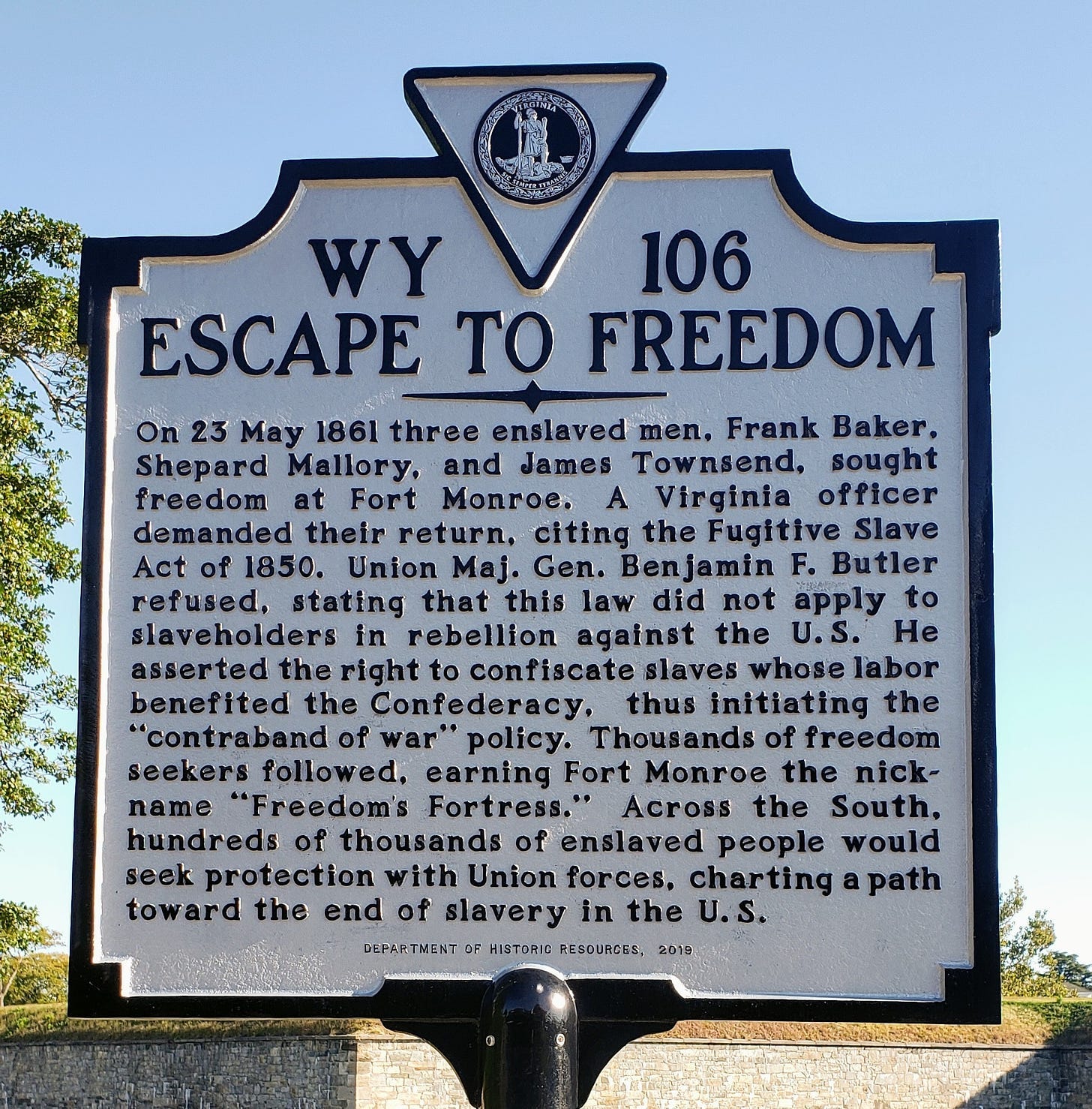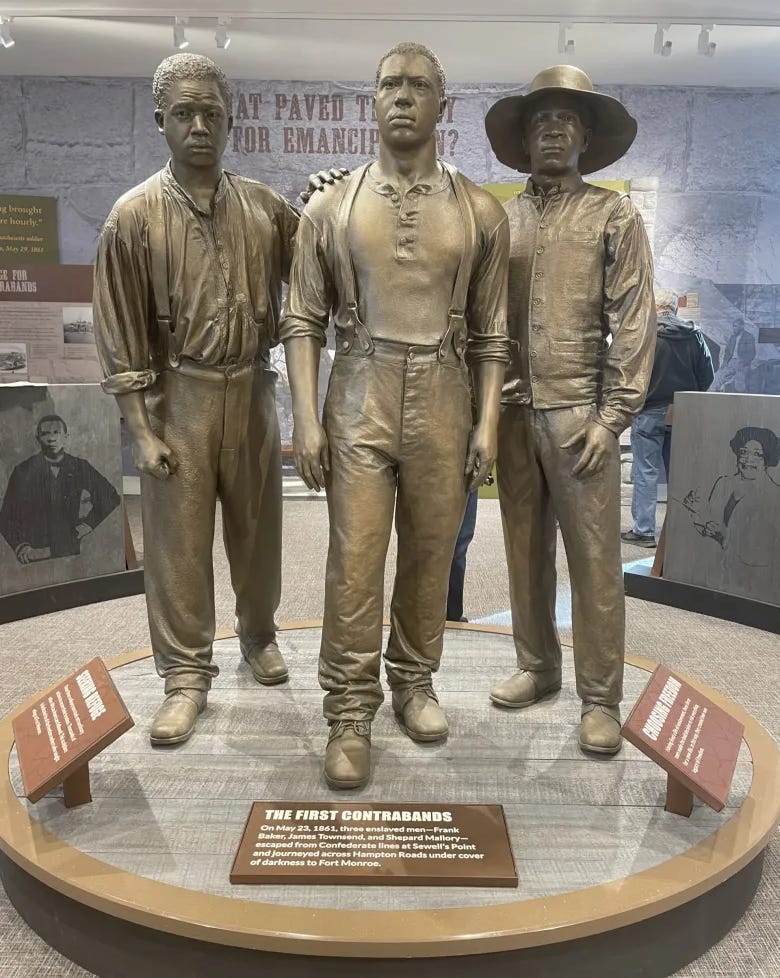OUR ORIGIN STORY
On Thursday, May 23, 1861, Frank Baker, James Townsend, and Shepard Mallory orchestrated the greatest heist in American history.
Working as forced laborers leased to Virginia’s 115th Confederate militia, the enslaved trio stole a small boat from the spot where Colonial Virginia Governor Sir George Yeardley and Supply Officer Abraham Peirsey negotiated a dirt-cheap price for “20 & odd” enslaved Africans in 1619. The self-emancipated men rowed the skiff to Union-occupied Fort Monroe and presented themselves to Union officer Major General Benjamin Butler.
Confederate Col. Charles Mallory was furious. His neck red with anger , Mallory demanded that Butler return the hijacked human chattel, and charged the Union army with looting. An attorney, Gen. Butler pointed out that the Black men weren’t stolen; the Union Army only received Mallory’s pilfered property.
According to Butler’s interpretation of U.S. military law, Baker, Townsend and Mallory were thieves who had stolen themselves. And since the men were being used as weapons by the Confederate traitors, the Union Army had as much right to confiscate them as a soldier who took an enemy’s gun during a battle. Asked by a top henchman for the Confederate Army “What do you mean to do with these negroes?” Butler’s answer changed the course of history:
“I shall hold these negroes as contraband of war.”
On Sunday, May 27, eight more escapees showed up. The next day, 47 men, women and children unenslaved themselves and fled to the Union camp. By Wednesday, new “Contrabands” were arriving by the hour.
President Abraham Lincoln wasn’t pleased.
Lincoln considered the Confederates to be insurrectionists and regarded the slaves as less-than-human property. “I have no purpose, directly or indirectly, to interfere with the institution of slavery in the States where it exists,” he said in his inaugural address weeks earlier, reiterating his stance that: “There must be the position of superior and inferior, and I as much as any other man am in favor of having the superior position assigned to the white race.”
But by treating the enslavers as enemy combatants, Butler forced Congress to act. On August 6, Congress passed An Act to Confiscate Property Used for Insurrectionary Purposes, making Butler’s argument national policy. A year later, the Second Confiscation Act declared that all escaped slaves in Confederate territory “shall be deemed captives of war, and shall be forever free of their servitude, and not again held as slaves.”
Escapes skyrocketed.
Many of these self-liberated drapetomaniacs found refuge in “contraband camps,” most of which were built and maintained by the formerly enslaved. The newly emancipated built their own housing, organized schools, protected the camps, held political rallies and recruited teachers. They reunited with family members, performed wedding ceremonies and shared their stories. By the formal end of the war for white supremacy, the Department of War counted more than 100 makeshift enclaves for refugees from America’s race-based, constitutionally enforced institution that stole labor and intellectual property through violence or the threat of violence.
Union soldier, spy and reconnaissance officer Harriet Tubman worked as a nurse in a South Carolina contraband camp, where she got the intel that led to the 1863 Combahee River Raid, which converted 700 captives to contraband status. William Henry Singleton recruited at least a thousand Black soldiers from the 20,000 refugees in New Bern, North Carolina’s camp. Perhaps the most remarkable example of this new self-sufficient American institution was the original— the Grand Contraband Camp near Fort Monroe, Virginia.
On Sept. 17, 1861, Mary Peake arrived at "Freedom's Fortress.”
Born a free Black woman in Virginia, Peake was a career criminal who repeatedly broke one of her state’s strictest laws — teaching enslaved people to read. Barely a month after the passage of the First Confiscation Act, she began teaching students under a large oak tree at the Grand Contraband Camp. Soon, Peake had to teach in shifts because so many people took advantage of the free education. On New Year’s Day in 1863, self-stolen thieves from across Virginia gathered under that tree to hear the first public reading of the Emancipation Proclamation.
But what happened to the contraband camps?
After the Civil War, they became the center of Black freedom. Some—like the tree in the Grand Contraband Camp now known as Hampton University —evolved into schools and historically Black colleges. African American neighborhoods and Black-owned business districts in St. Louis, Nashville and Kansas City are former contraband camps. Dozens of self-sufficient “freedmen’s towns,” including Roanoke Island, North Carolina, and Promised Land, South Carolina were founded on these sites and became hubs of Black political power. Contraband camp produced more than 200 schools, 12 HBCUs, three Black senators, 22 U.S. representatives, hundreds of state legislators and local elected officials and at least a million registered voters.
…And American democracy.
The Emancipation Proclamation only affected an estimated 25,000-75,000 people —specifically those still enslaved in Confederate states under Union control. President Lincoln never intended to free them. There is not a single speech, document or shred of contemporaneous evidence from anyone arguing the Civil War was fought to end race-based servitude. And, while the 13th, 14th and 15th Amendments banned most forms of slavery, made contrabands into citizens and protected the right to vote, they simply protected the rights of people who had already freed themselves.
By stealing their freedom, Frank Baker, James Townsend, Shepard Mallory and others constructed a democratic society where none existed. These autoabolitionists built homes, schools and a Black political power base, and also rewrote the state constitutions that created universal male suffrage, free public education and due process. South Carolina invented the American education system as we know it. Without these Black founding Fathers, there would be no freedom, democracy or an “American Dream.” The legal definition of “American” wouldn’t even exist without them.
This is an emancipation proclamation.
In the ongoing culture war against history, integrity and facts, mainstream media has sided with the faction that declared war on truth. Our most trusted news sources and social media platforms actively participated in the effort to euphemize white supremacy, whitewash truth, and silence our voices. However, the increasing democratization of media presents us with a new opportunity:.
What if we just stole ourselves?
This is a new community for people who are unafraid to declare their own independence. It is a stolen skiff and a second-shift classroom. It is a recruiting ground for the liberation-minded and a refuge for the self-emancipated. More importantly, Iit is a community that we will build from scratch.
Welcome to ContrabandCamp.
What is ContrabandCamp?
ContrabandCamp is a thinkers’ collective.
We will publish rigorous reporting, expert analysis and unapologetically Black dialogues on issues that affect the lives of Black people.
But don’t get it twisted; this ain’t the trap New York Y Times. While ContrabandCamp contributors are the best and Blackest storytellers, journalists, and public scholars, we will also publish our roster also includes cultural critics, comedians, authors, media critics, reviewers, music journalists, podcasters and others who help form the four pillars on which ContrabandCamp rests:
Liberation journalism: Original reporting, data-based analysis and investigative journalism focused on issues that affect Black communities and people individuals. (More on that later)
Truth-telling: Our BlackCheck series will research and fact-check popular media narratives. Scholars, activists, educators and writers will add nuanced perspectives and informed opinions to the public record.
Bearing witness: ContrabandCamp is dedicated to amplifying Black storytelling. Skilled journalists and young reporters will share overlooked, ignored and forgotten perspectives often missing from mainstream media outlets. Our “Campfire Stories” series will feature essays, book excerpts, short stories and even videos from hilarious comedians, celebrated writers and new voices.
The culture: Uniquely Black perspectives on music, art, sports, pop culture and the that unite (and divide) us, including: Would you buy an Eddie King Jr. comeback album? Did capitalism ruin hip-hop? Movie, television and music reviews from accomplished critics and reviewers.
Subscribers will have access to original reporting, articles, podcasts and videos telling our stories in our voices, speaking our language, all with one goal in mind:
To get free.
We understand this content is much less likely to “go viral” than the ContrabandCamp will not produce popular hot takes and trending thinkpieces. However, we believe it is possible to build a dedicated, niche audience interested in nuanced dialogue and deep dives from a Black perspective. In a post-fact world where “reality” is a television genre and legislators have literally made it illegal to tell the truth, Black stories are now a form of contraband.
So we built a camp.
What is “Liberation Journalism?”
ALL media is biased.
The standard that many media outlets regard as “objectivity” is usually indifference cosplaying as neutrality. The best journalists strive to report factual information as accurately and fairly as possible. Still, every writer, reporter and editor makes choices that shape the stories that we consume. More importantly, they also choose which details and whose perspectives are not worthy of being included. In many cases, the experiences and perspectives of Black people are excluded from the public record. While the writers and editors at ContrabandCamp hold ourselves to the highest journalistic and editorial standards, we will not adhere to the false media construct of “objectivity.”
I know that sounds boring AF, but don’t worry. ContrabandCamp is not just a melanated clone of the pretentious, stoic content you can find on any Biscoff-colored-owned outlet. Because we are unencumbered by the constructs of Caucasity or the desire for virality, we can tell our stories in our voices. Although we prefer nuance to hyperbole, we are not afraid to call a thing a thing.
Liberation journalism is as smart and bold and as brilliant and Black as the culture we created.
Join the Campsite
Aside from the news, politics, sports, culture and our stories, ContrabandCampers get access to podcasts, live events and a complete archive of content, including:
First access to content: Early access to everything on ContrabandCamp.
Premium content: Podcasts, articles and video content for subscribers only.
The complete archives: Go back in time, even before the site began!
CampFire Stories: Here, your favorite Black novelists, playwrights, authors, comedians, poets and storytellers share short stories, early excerpts and drafts of their art.
The complete archives of The Black One podcast: From 2012 until 2018, Michael Harriot traveled the country collecting over 200 unfiltered long-form interviews with interesting people sharing their untold stories.
NegusWhoRead Archives: Harriot’s archive of thousands of articles published on Michael Harriot’s personal blog.
ContrabandCampers:
Michael Harriot: Founder
When CNN wanted to know the origin of the phrase "woke," they called Michael Harriot. When MSNBC needed someone to explain critical race theory, they called Michael Harriot. When asked to choose one name that embodied the collective ethos of Black Twitter, Michael Harriot was the runaway answer.
Michael Harriot is an award-winning journalist, bestselling author, celebrated poet and public historian hailed as "one of the most eloquent writers in America." His NY Times Bestseller Black AF History: The Unwhitewashed Story of America is required reading in at least ten universities and numerous colleges have adopted his "Race as an Economic Construct" curriculum, which examines social structures using history, data and the laws of supply and demand.
Michael's acerbic wit, biting commentary, and investigative reporting influence everything from presidential politics to pop culture. As the originator of the phrase “invited to the cookout,” his social media threads contextualizing history are shared by millions, while his award-winning journalism appeared in the Washington Post, The Atlantic, the New York Times and his mother’s refrigerator. His work on the Amber Ruffin Show received a 2021 Emmy nomination for Outstanding Writing for a Variety Series. Michael teamed with Pharrell Williams to create the award-winning podcast "Drapetomaniax: Unshackled History."
Michael earned degrees in mass communications and history from Auburn University and a master's degree in macroeconomics and international business from Florida State. His writing has been honored by the National Association of Black Journalists, the Emmys, the Webbys and the American Library Association.
Genetta Adams: Co-founder and Editor-in-chief
Genetta M. Adams is an editor with more than 25 years of experience in the journalism game. She has worked for legacy and digital media, including Newsday, The Associated Press, The Root and theGrio.
The No. 1 thing she’s learned throughout her career is always bet on Black.
Jeremy Harriot: Digital Media Editor
Jeremy Harriot is a technology advocate whose work aims to empower individuals through training in the use of digital media and technological innovation. Jeremy spends his professional time developing multimedia projects for education, live-streaming events and social media.
Elie Mystal: Contributor
Elie Mystal is The Nation’s justice correspondent and the host of its legal podcast, Contempt of Court. He is also an Alfred Knobler Fellow at the Type Media Center. His first book is the New York Times bestseller Allow Me to Retort: A Black Guy’s Guide to the Constitution, published by The New Press.
Tiffany D. Cross: Contributor
Tiffany D. Cross is a journalist, TV host, podcast host, author, and speaker.
She is the current co-host of iHeart Podcast’s “Native Land Pod” with Angela Rye and Andrew Gillum, which debuted in 2024 on Apple as the number one downloaded podcast in America. Tiffany also hosts “ACross Generations,” with Will Packer Media and iHeart Podcasts, where she convenes multigenerational women to discuss a variety of subjects ranging from our changing perspectives on love and sex to what you might tell your younger self about money and career. Tiffany previously hosted The Cross Connection on MSNBC where she averaged 4.6 million viewers a month.
A 2020 fellow of Harvard’s Institute of Politics, Tiffany has spent more than 20 years navigating politics, media, labor, all communities of color, and the private sector. She is also the author of the best-selling book Say It Louder: Black Voters, White Narratives, and Saving Our Democracy.
Stephen A, Crockett Jr.: Contributor
Stephen A. Crockett Jr. is a journalist, political analyst and editor who has worked for The Root, The Washington Post, and the San Jose Mercury News. His opinionated work began around the age of seven, when he successfully argued that the Boy Scouts was not a group he needed to belong to.









